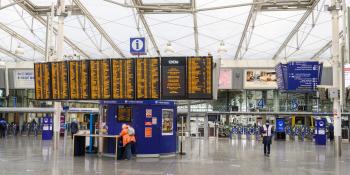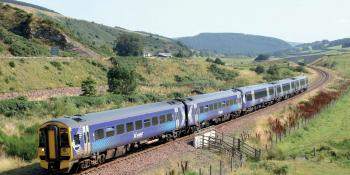Rail Freight Group
In years to come, A level students will write essays on ‘What happens when you switch off the economy?’. They will of course be able to look at the current crisis with the benefit of hindsight and recommend what might have been done differently. Yet for now we are all part of the experiment, and it can be hard to find the way forward. What are the best actions to ensure that, once the health emergency is resolved as well as it can be, businesses can prosper again, and individuals return to their jobs?
Businesses in the transport sector are as adversely affected as any by the restrictions on movement, and the challenges for airlines and passenger railways are well documented. Passenger travel is almost entirely suppressed, and services limited to those necessary for essential travel, where they exist at all. As painful as this is, there is at least now some sense of stability around which companies can plan. For freight, it is rather more challenging.
The impact on rail freight started ahead of the wider UK restrictions, as the lockdown in Wuhan in China led to a huge reduction in container shipping. From the start of March volumes of intermodal traffic plummeted. Operators and customers were forced to stand down services and others which did run were less well-loaded than is necessary to be economic. Some weeks have seen well over 300 trains cancelled from the major deep sea ports. As restrictions have lifted in China, shipping services are starting to resume, but with the UK market suppressed it is unlikely all trains will be fully operational again soon.
The construction market is also feeling its share of trouble. Building sites were not formally required to close down at the start of lockdown, but many did, and some regional administrations imposed more stringent requirements on sites under their control. This has led to a drop-off in aggregate and cement volumes across the country. Other flows such as automotive and finished cars have ceased entirely.
This has put the most tremendous strain on freight operators and others in the sector. In some cases, businesses have suspended all operations, furloughed staff and stood down equipment. However, in many cases this has not been possible, because there are also many essential services that have to keep running. Here, companies are looking to minimise cost, to implement measures to manage cash flow and work with suppliers and customers to deliver financial stability to the greatest extent.
Of those essential services the most high profile are those trains which are continuing to run on behalf of the retail sector. With increased demand for supermarket products the trains have been running at record length and fill levels. This includes services operated by Russell Logistics for Sainsbury’s and others which recently ran to Scotland with 1,500 tonnes and 800 metres behind a single Class 88, whilst the Tesco Express on the same route has also increased its length. Other vital services include the biomass trains for electricity generation and services for industries such as steel making, where production continues. It is also likely rail freight operators will be asked to run some additional trains if the sickness rates rise in road haulage or if Government needs essential supplies conveying across the country.
It has been particularly encouraging therefore to see both Government and Network Rail focus on the use of the rail network for freight movements. Network Rail’s plans ensure priority for essential freight, both in terms of network paths and regulation and in the planning of maintenance. In the event some parts of the network are restricted if staff sickness levels increase, the most important freight routes are identified and will be operated as key routes wherever possible.
Coupled with this, we have been very pleased to see the level of public support and positive narrative for rail freight. Network Rail’s own press releases have been keen to show how it is supporting essential deliveries, and there are comments all over social media showing a new respect for our trains. It will be interesting to see how long this lasts once passenger services resume a full timetable, but we hope it will have led to a new appreciation of what we do.
There is of course a long way ahead until that point. For now, a relentless focus on financial stability for all parts of the supply chain remains a priority, including Government support for essential businesses. Ensuring the sector is fit to adapt to the longer-term economic impacts will be a longer-term challenge.
An opinion column of the Rail Freight Group, www.rfg.org.uk





